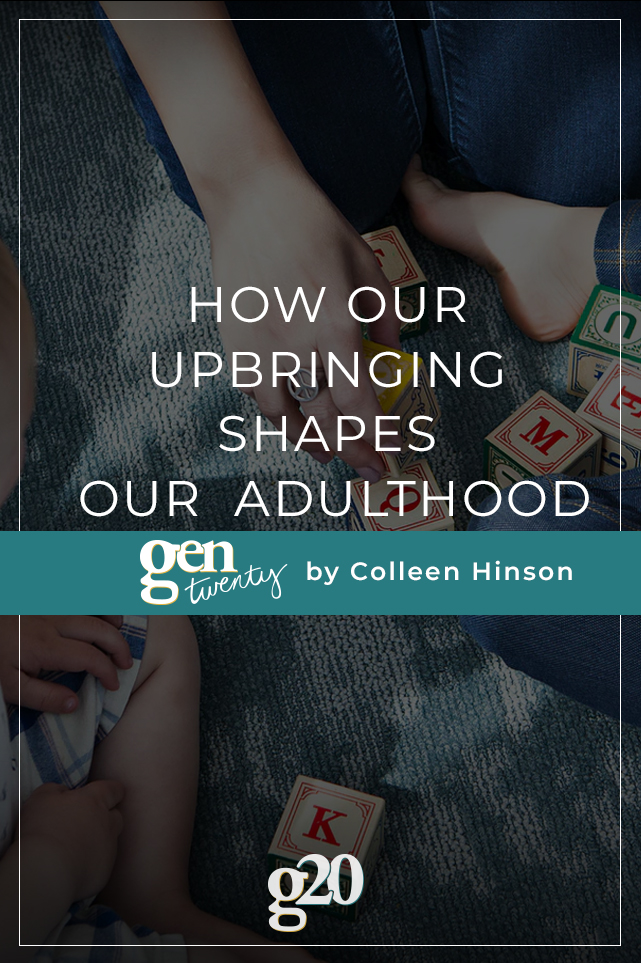I listened to an interesting podcast recently which outlined the reality of how the influence of parenting, or lack thereof, is quite a small factor in how we turn out as adults. It’s truly amazing to learn about how our upbringing shapes our adulthood.
How Our Upbringing Shapes Our Adulthood
The psychologist Yuko Munakata explained how parents often feel unduly responsible for their children’s behaviors and choices. She also spoke about how placing blame or responsibility on our parents for the way we are today is often ill-assumed.
Parents do not have control in shaping who their children become. But they can have influences whether obvious or unseen.
Turns out we need to consider many more factors when evaluating how upbringing shapes adulthood. Those include an individual’s genetics, their environment, peers, and culture.
But why does all of that matter when we’re already an adult? Fortunately exploring those components throughout our youth can help us understand why we are the way we are and how to change that if we so desire.
I’ve spent a considerable amount of time trying to figure out why I am the way I am. And not so much that I don’t feel I understand myself but more in the sense of wanting to be a more healthy, well-structured adult.
I’ve found digging deeper into my childhood opens a world of knowledge on why I may have learned certain behaviors or found myself in a common pattern of decision making. Some of this digging has been guided by experienced health professionals but as a whole I now have a clearer outline of my hard wiring and how it developed.
For things I struggle with as an adult it is helpful to see how those wires are arranged because I can figure out how to re-organize my approaches to be more successful. Or, to find my strengths and better understand where they are best applied.
I grew up in an incredibly sheltered Christian home and for a time we were part of a homeschooling community. The people I was surrounded by throughout my youth were primarily Christian.
When I reached middle school, however, I started going to public school and was introduced to new influences. My parents also worked through a separation and myself and my four siblings were disjointed for some time.
I threw myself into academics and managed to work around my ADHD throughout the years and although I felt I was a very optimistic person, I did struggle with self-criticism and self-worth.
But I look at my siblings and see how they fared through their upbringing and see just how different the motions of childhood affected them. It’s astonishing to realize the timing of events along their age progression and the nature of each of their characters just how differently they developed.
We bond now over similar struggles we felt in our family dynamic or in school but also discover how we have different perspectives on what those parts meant to us and how we each moved forward from them.
My sister has talked to me about the social pressure she experienced in school from her peers and I recollected for her how I felt very little push to be “popular” or accepted. I never truly cared what other schoolmates thought or said about me, but I zoned in on approval from teachers and my parents in academics.
While she stressed herself out about her appearance and peer acceptance, I wrestled with perfectionism in schoolwork and grades.

With that broad synopsis of my childhood it is easy to see how a few of those factors influenced my upbringing. I rediscovered how my beliefs of right and wrong were deeply rooted by the Christian community I was raised in.
As my environment shifted from homeschooling to public school there was a different slew of influences which did open opportunities for me to find success in academics. I have been able to look closer into where my obsession with perfectionism grew from and how I developed my sense of self-worth.
It has truly been eye opening to see how I came to be who I am now. So now as an adult this insight has helped me in so many ways to help me grow.
I have found better ways to garner self-worth and to let go of things I once struggled to keep perfect. And there are so many other facets with which understanding my childhood has helped me become a more successful adult.
We can challenge the behavior patterns or thought processes that were so long ago rooted as we began to grow as individuals. This gives us opportunities to evaluate and change how we approach various areas of our life and decisions we make.
However, I think it is very important to realize the magnitude of the roots that we put down throughout our upbringing. We need to be patient with ourselves in any attempts to shift our behaviors or choice patterns.
As we slowly break down and figure out the brickwork of our childhood we can rebuild ourselves in adulthood. This means we can learn how to make progress in long term struggles or re-approach something we were not successful with in the past.
If you’re not sure where to begin, perhaps speaking with other children you grew up with, whether siblings or old friends could provide insight. Or, even better, seek a licensed health professional who is trained in providing guidance when evaluating childhood experiences.
Sometimes the past can be hard to review and interpret but the clarity of how our upbringing shapes our adulthood can be life changing.
